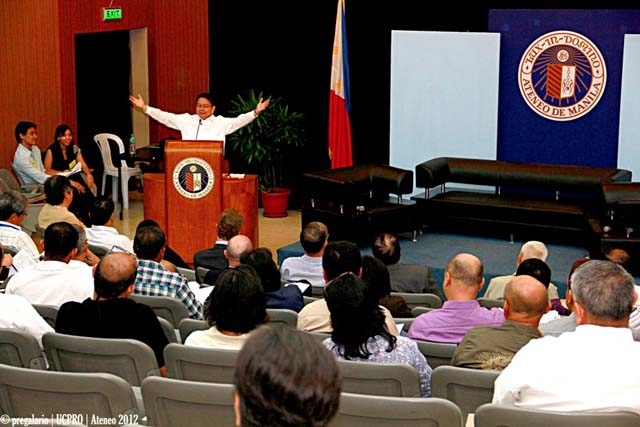
COLLABORATIVE EFFORT. The Ateneo and Haribon are working with Newcastle University of the United Kingdom in preserving marine life in the Philippines through the Darwin Initiative. Photo courtesy of Margarita Lavides, PhD.
THE BRITISH government has donated £294,151 (approximately P20 million) to the Environmental Science (ES) Department and the Haribon Foundation through the Darwin Initiative. Newcastle University will be working together with the two parties.
The partnership will work on Darwin Initiative Project No. 19-020, called “Responding to Fish Extirpations in Global Epicenter of Marine Biodiversity.”
Established in 1992, the Darwin Initiative is the avenue through which the United Kingdom (UK) assists countries that have a high level of biodiversity but are lacking in financial resources. The Department for Environment, Food and Rural Affairs of the British government funded the grant.
“The purpose of the project is to identify threatened or locally extinct fish species in five key marine biodiversity areas of the country using fishers’ knowledge, underwater visual census and fish landings data,” project coordinator Margarita Lavides, PhD of the ES Department said in an email interview.
The five key marine biodiversity areas are the Verde Island Passage between Mindoro and Batangas, Palawan, the Polillo Group of Islands in Quezon, Danajon Bank in Bohol and Lanuza Bay in Surigao del Sur.
The project will also model changes in the abundance of fish species in these areas over time.
Most importantly, Lavides says, the project will help local fishermen and stakeholders by enhancing their capabilities in resource management and reconciling conservation needs with sustainable livelihood.
Anabelle Plantilla, chief operating officer of the Haribon Foundation, said that they also aim to formulate policy recommendations on the local, national and international levels for the preservation of marine life.
“The project will use scientifically sound techniques and information to design socially acceptable methods and strategies on marine resource management,” she said.
Epicenter of marine biodiversity
“For me, this [project] is both expedient and interesting,” said project leader Nicholas Polunin, PhD of the School of Marine Science and Technology in Newcastle University through an email interview.
Polunin said that the endeavor is practical because the Philippines is part of the world epicenter of marine biodiversity, with an abundance of coral reefs inhabited by about 50% of marine fish species in some 0.01% of the total ocean area.
“[It is] likewise the most threatened oceanic region. That makes the Philippines an important site for global conservation action,” Lavides said.
In addition, Plantilla said that safeguarding the marine sanctuary of the country would ensure food security and sustain livelihoods for the coastal communities.
Underwater surveys would be conducted to spot the presence of species at specific locations, and also on land, to gather fishermen’s recollections of their past and present catches, and in the lab, to analyze landings data.
The Philippines belongs to the 17 megadiverse countries that are sanctuary to most of the earth’s fauna and flora.
Aquatic extirpation
“Much has been said about the sorry state of Philippine marine ecosystem, how degraded the coral reefs are with less than five percent of it in excellent condition,” said Lavides.
She also said that an unknown number of species of mangroves and sea grasses have correspondingly been decimated and made extinct.
According to the Food and Agriculture Organization of the United Nations, the Philippines is ranked as the eighth largest global producer of fish. The Department of Environment and Natural Resources also says that the country is the 4th largest tuna supplier in the world.
However, the destruction of marine habitats has been causing a decline in fish catches and the aggravation of poverty in coastal areas.
“If [the project] finds evidence for losses, the aim is then to identify the specific nature of the threat and explore alternatives to the threat—for example, different ways of fishing,” said Polunin.
Plantilla noted that human activities such as destructive fishing practices using dynamite, cyanide and fine-mesh nets, overfishing and coral harvesting are to be blamed for the extirpation of some marine species.
Meanwhile, Polunin did not overrule the possible role of other issues such as “climate-warming related bleaching,” which causes coral habitat degradation.
“In many such threats, it is corals that are the Achilles’ heel, and that’s important because they are the major creators of habitat. They form the major physical building blocks of the whole ecosystem. Without them, we can expect this special ecosystem to crumble,” Polunin said.
Pollution, sedimentation, siltation and coastal development also aggravate degradation, said Lavides.
Helping local stakeholders
With the identification of locally extinct fish species and the causes of this extinction, the project hopes to put in place policies that can help locals in protecting endangered fish species.
“In sites where there are marine protected areas (MPA), the information generated by the project will assist local fishers in management of their MPAs. Properly managed MPAs will ensure sustainability of their livelihoods,” Plantilla said.
The participants of the project will also conduct workshops on marine ecology, fisheries and conservation, trainings on fisheries monitoring, and the distribution of information materials.
Aside from fishing, Polunin also sees the need to help stakeholders in their management of diving tourism and other practices related to the marine environment.
The project’s long-term focus also includes the assessment of livelihood activities and the institution of conservation livelihood agreements, along with the corresponding implementation, monitoring and evaluation.







